商务英语谈判unit 13 Conclusion of Business[精]
- 格式:ppt
- 大小:693.00 KB
- 文档页数:14
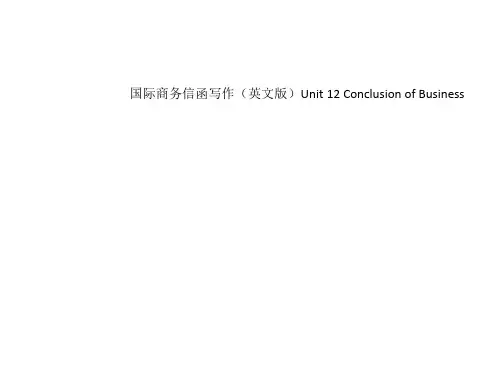
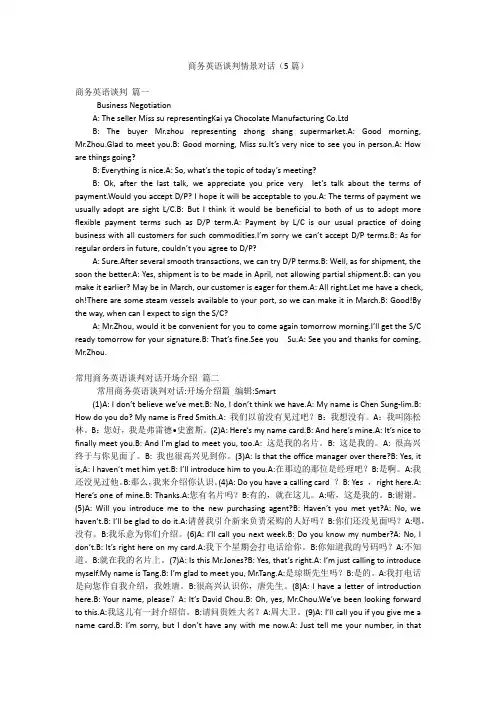
商务英语谈判情景对话(5篇)商务英语谈判篇一Business NegotiationA: The seller Miss su representingKai ya Chocolate Manufacturing Co.LtdB: The buyer Mr.zhou representing zhong shang supermarket.A: Good morning, Mr.Zhou.Glad to meet you.B: Good morning, Miss su.It’s very nice to see you in person.A: How are things going?B: Everything is nice.A: So, what’s the topic of today’s meeting?B: Ok, after the last talk, we appreciate you price very let’s talk about the terms of payment.Would you accept D/P? I hope it will be acceptable to you.A: The terms of payment we usually adopt are sight L/C.B: But I think it would be beneficial to both of us to adopt more flexible payment terms such as D/P term.A: Payment by L/C is our usual practice of doing business with all customers for such commodities.I’m sorry we can’t accept D/P terms.B: As for regular orders in future, couldn’t you agree to D/P?A: Sure.After several smooth transactions, we can try D/P terms.B: Well, as for shipment, the soon the better.A: Yes, shipment is to be made in April, not allowing partial shipment.B: can you make it earlier? May be in March, our customer is eager for them.A: All right.Let me have a check, oh!There are some steam vessels available to your port, so we can make it in March.B: Good!By the way, when can I expect to sign the S/C?A: Mr.Zhou, would it be convenient for you to come again tomorrow morning.I’ll get the S/C ready tomorrow for your signature.B: That’s fine.See you Su.A: See you and thanks for coming, Mr.Zhou.常用商务英语谈判对话开场介绍篇二常用商务英语谈判对话:开场介绍篇编辑:Smart(1)A: I don’t believe we’ve met.B: No, I don’t think we have.A: My name is Chen Sung-lim.B: How do you do? My name is Fred Smith.A: 我们以前没有见过吧?B:我想没有。
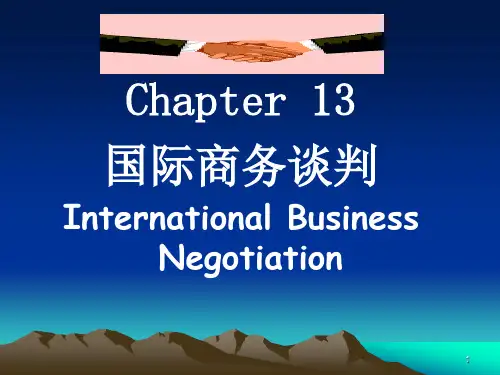
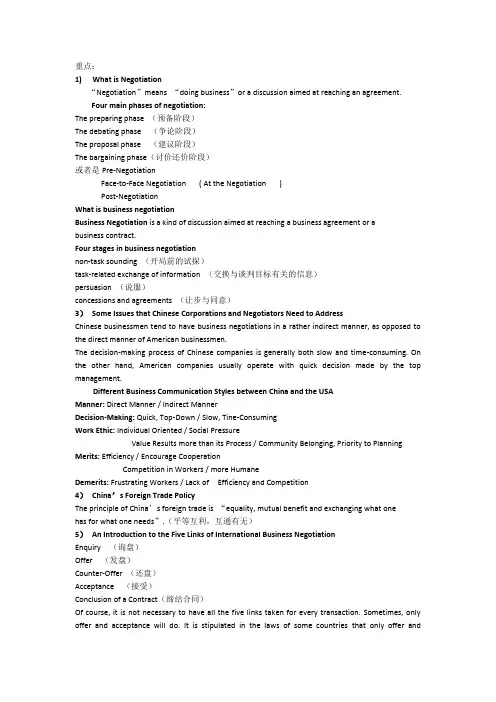
重点:1)What is Negotiation“Negotiation”means “doing business”or a discussion aimed at reaching an agreement.Four main phases of negotiation:The preparing phase (预备阶段)The debating phase (争论阶段)The proposal phase (建议阶段)The bargaining phase(讨价还价阶段)或者是Pre-NegotiationFace-to-Face Negotiation ( At the Negotiation )Post-NegotiationWhat is business negotiationBusiness Negotiation is a kind of discussion aimed at reaching a business agreement or abusiness contract.Four stages in business negotiationnon-task sounding (开局前的试探)task-related exchange of information (交换与谈判目标有关的信息)persuasion (说服)concessions and agreements (让步与同意)3)Some Issues that Chinese Corporations and Negotiators Need to AddressChinese businessmen tend to have business negotiations in a rather indirect manner, as opposed to the direct manner of American businessmen.The decision-making process of Chinese companies is generally both slow and time-consuming. On the other hand, American companies usually operate with quick decision made by the top management.Different Business Communication Styles between China and the USAManner: Direct Manner / Indirect MannerDecision-Making: Quick, Top-Down / Slow, Tine-ConsumingWork Ethic: Individual Oriented / Social PressureValue Results more than its Process / Community Belonging, Priority to Planning Merits: Efficiency / Encourage CooperationCompetition in Workers / more HumaneDemerits: Frustrating Workers / Lack of Efficiency and Competition4)China’s Foreign Trade PolicyThe principle of China’s foreign trade is “equality, mutual benefit and exchanging what onehas for what one needs”.(平等互利,互通有无)5)An Introduction to the Five Links of International Business NegotiationEnquiry (询盘)Offer (发盘)Counter-Offer (还盘)Acceptance (接受)Conclusion of a Contract(缔结合同)Of course, it is not necessary to have all the five links taken for every transaction. Sometimes, only offer and acceptance will do. It is stipulated in the laws of some countries that only offer andacceptance are the two required factors, failure of which will make no contract.Brief Introduction to Incoterms®2010Incoterms are used in international import/export contract to show the responsibility of the buyers and the sellers. They define who is responsible for “freight”or “carriage”(transportation) , insurance against risks, “duty”(tariff) and “clearance”(import and export documentation).The word “INCOTERMS”is short for International Rules for the Interpretation of Trade Terms, and most frequently used in international sales transactions.The latest version is INCOTERMS ® 2010, which already became effective on Jan. 1st 2011. Previous versions, including INCOTERMS 2000, are now outdatedThe ® sign means a registered trade mark, it became a necessary part of Incoterms ®2010 International Tender or Bid 国际性招投标Concepts Related Tender or Bid onTender 投标(British English)Bid 投标(American English)submit a tender / bid(submission of tender / bid)投标Tenderer or bidder 投标者Winning bidder / successful tenderer 中标者To invite tender / bid 招标Invitation for (to) tender / Bids 招标Tenderee / the bid inviting party 招标人/ 招标方Generally speaking, people often using tendering / bidding to refer to invite tender / bid and tender / bid.Tendering / Bidding 招投标International tendering / international bidding 国际招投标Submission of Tender (投标)Tenders’/ Bidders’behaviors to deliver their bid / tenders forms to the tenderee according to the conditions of the Tender notice within the specified period of time.投标人根据招标公告或招标单规定的条件,在指定的时间内向招标人递盘的行为。


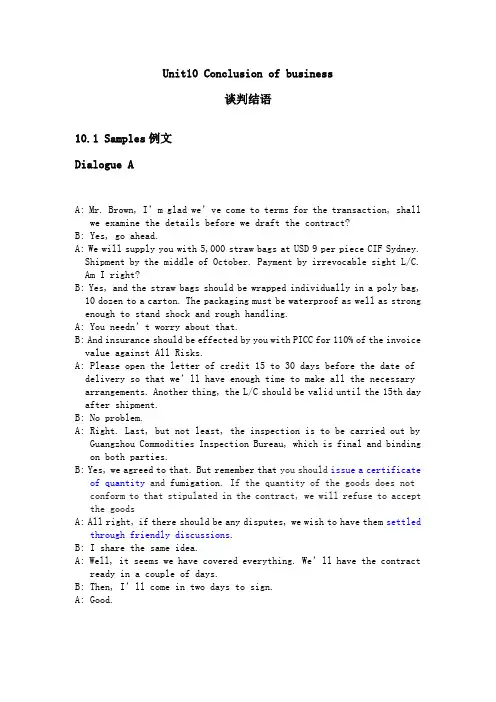
Unit10 Conclusion of business谈判结语10.1 Samples例文Dialogue AA: Mr. Brown, I’m glad we’ve come to terms for the transaction, shall we examine the details before we draft the contract?B: Yes, go ahead.A: We will supply you with 5,000 straw bags at USD 9 per piece CIF Sydney. Shipment by the middle of October. Payment by irrevocable sight L/C. Am I right?B: Yes, and the straw bags should be wrapped individually in a poly bag, 10 dozen to a carton. The packaging must be waterproof as well as strong enough to stand shock and rough handling.A: You needn’t worry about that.B: And insurance should be effected by you with PICC for 110% of the invoice value against All Risks.A: Please open the letter of credit 15 to 30 days before the date of delivery so that we’ll have enough time to make all the necessary arrangements. Another thing, the L/C should be valid until the 15th day after shipment.B: No problem.A: Right. Last, but not least, the inspection is to be carried out by Guangzhou Commodities Inspection Bureau, which is final and binding on both parties.B: Yes, we agreed to that. But remember that you should issue a certificate of quantity and fumigation. If the quantity of the goods does not conform to that stipulated in the contract, we will refuse to accept the goodsA: All right, if there should be any disputes, we wish to have them settled through friendly discussions.B: I share the same idea.A: Well, it seems we have covered everything. We’ll have the contract ready in a couple of days.B: Then, I’ll come in two days to sign.A: Good.A:布朗先生,很高兴我们已达成了交易。
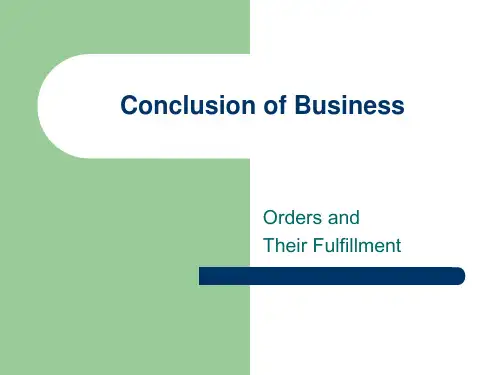
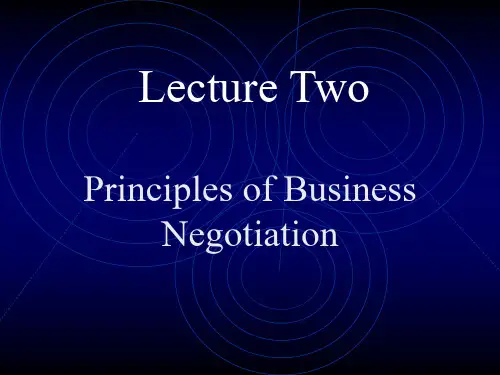
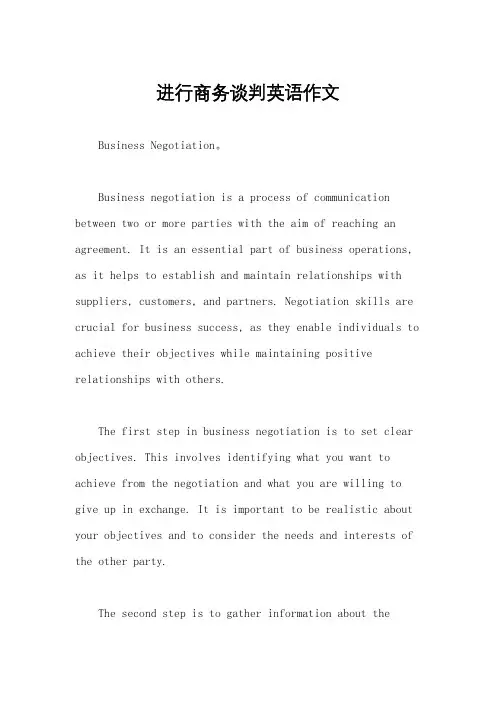
进行商务谈判英语作文Business Negotiation。
Business negotiation is a process of communication between two or more parties with the aim of reaching an agreement. It is an essential part of business operations, as it helps to establish and maintain relationships with suppliers, customers, and partners. Negotiation skills are crucial for business success, as they enable individuals to achieve their objectives while maintaining positive relationships with others.The first step in business negotiation is to set clear objectives. This involves identifying what you want to achieve from the negotiation and what you are willing to give up in exchange. It is important to be realistic about your objectives and to consider the needs and interests of the other party.The second step is to gather information about theother party. This involves researching their business,their products or services, and their negotiation style. It is also important to understand their needs and interests, as this will help you to identify areas of common ground and potential trade-offs.The third step is to prepare for the negotiation. This involves developing a negotiation strategy, which includes deciding on the negotiation style, the opening offer, and the concessions that you are willing to make. It is also important to anticipate the other party's responses and to prepare counterarguments.The fourth step is to conduct the negotiation. This involves opening the negotiation, exchanging proposals and counterproposals, and making concessions. It is important to remain calm and professional throughout the negotiation, and to listen carefully to the other party's concerns and interests.The final step is to reach an agreement. This involves documenting the terms of the agreement and ensuring thatboth parties understand and agree to them. It is also important to follow up on the agreement and to maintain a positive relationship with the other party.In conclusion, business negotiation is an essential skill for success in the business world. By setting clear objectives, gathering information, preparing for the negotiation, conducting the negotiation, and reaching an agreement, individuals can achieve their objectives while maintaining positive relationships with others.。
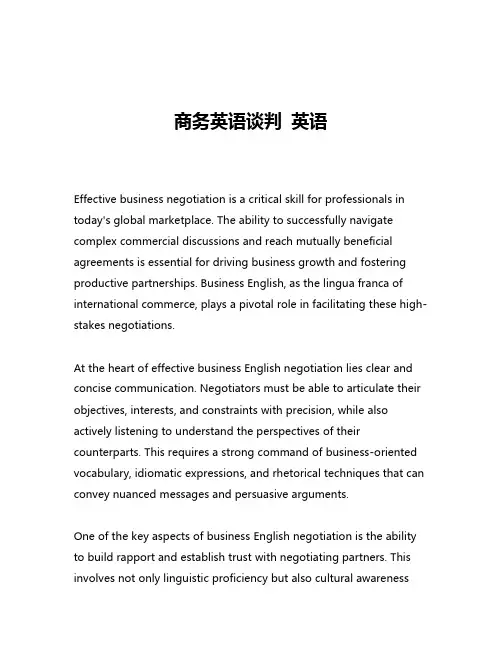
商务英语谈判英语Effective business negotiation is a critical skill for professionals in today's global marketplace. The ability to successfully navigate complex commercial discussions and reach mutually beneficial agreements is essential for driving business growth and fostering productive partnerships. Business English, as the lingua franca of international commerce, plays a pivotal role in facilitating these high-stakes negotiations.At the heart of effective business English negotiation lies clear and concise communication. Negotiators must be able to articulate their objectives, interests, and constraints with precision, while also actively listening to understand the perspectives of their counterparts. This requires a strong command of business-oriented vocabulary, idiomatic expressions, and rhetorical techniques that can convey nuanced messages and persuasive arguments.One of the key aspects of business English negotiation is the ability to build rapport and establish trust with negotiating partners. This involves not only linguistic proficiency but also cultural awarenessand sensitivity. Successful negotiators must be able to adapt their communication styles to align with the cultural norms and expectations of their counterparts, whether they are from the same or different cultural backgrounds.Effective business English negotiation also demands strategic planning and preparation. Negotiators must thoroughly research the market, industry, and their counterparts to anticipate potential challenges, identify areas of common ground, and develop a negotiation strategy that aligns with their overall business objectives. This includes the ability to analyze complex financial and legal information, as well as the capacity to think critically and creatively to devise innovative solutions.Moreover, business English negotiation often involves the use of specialized terminology and concepts related to finance, law, and other relevant domains. Negotiators must be well-versed in these areas to ensure they can effectively communicate and understand the implications of the agreements they are negotiating.In addition to linguistic and technical competence, successful business English negotiation also requires a range of interpersonal skills. Negotiators must be able to manage emotions, both their own and those of their counterparts, to maintain a constructive dialogue and find common ground. They must also be skilled in conflictresolution, problem-solving, and decision-making to navigate the complexities of high-stakes negotiations.Furthermore, the digital age has introduced new challenges and opportunities for business English negotiation. With the increasing prevalence of virtual and hybrid negotiation formats, negotiators must be adept at using various communication technologies and platforms to engage effectively with their counterparts, while still maintaining the personal touch and rapport-building that are essential for successful outcomes.In conclusion, effective business English negotiation is a multifaceted skill that requires a combination of linguistic proficiency, cultural awareness, strategic planning, technical expertise, and interpersonal capabilities. By mastering these essential elements, professionals can navigate the complex world of international business negotiations with confidence and achieve mutually beneficial outcomes that drive their organizations forward.。
商务英语谈判长对话范文Ah, the art of negotiation, where the subtle dance of words can lead to the most lucrative of deals or the most devastating of losses. Picture this: a sleek boardroom in the heart of a bustling business district, two parties poised at the edge of a potential partnership. The air is thick with anticipation as the conversation begins."Good morning, Mr. Smith, it's a pleasure to finally meet you in person," starts the CEO of Alpha Corp, extending afirm handshake. "Likewise, Ms. Johnson, I've heard a lot about your innovative approach to business," responds the CFO of Beta Industries, a smile playing on his lips.The two sit down, a table laden with papers, laptops, and the occasional coffee cup. "Let's dive right in," Ms. Johnson suggests, her tone confident yet inviting. "We're here to discuss the terms of our potential collaboration. I believe we both have a lot to gain."Mr. Smith nods, his eyes scanning the proposal. "Absolutely, and we're eager to explore how our strengths can complement each other. However, I must say, the initial pricing structure you've proposed seems a bit steep for our market."Ms. Johnson leans back, a thoughtful expression on her face. "I understand your concerns, but I assure you, thevalue we're offering is unparalleled. Perhaps we couldconsider a tiered pricing model that reflects the different levels of service we provide?"The back-and-forth continues, each side presenting their case with a blend of facts, figures, and strategic persuasion. There are moments of tension, of course, but also moments of laughter, as they find common ground."Let's not forget the long-term benefits of this partnership," Mr. Smith emphasizes, his voice steady. "The synergy between our companies could open doors we haven'teven considered yet.""I couldn't agree more," Ms. Johnson responds, her eyes sparkling with the thrill of the negotiation. "This isn'tjust about the numbers on paper; it's about building a relationship that will stand the test of time."As the hours pass, the dialogue evolves, each point carefully weighed, each concession strategically given. The negotiation is a testament to the power of communication, the finesse of diplomacy, and the relentless pursuit of mutual success.In the end, it's not just about reaching an agreement;it's about forging a bond that will drive the partnership forward. And as the final signatures are affixed to the contract, there's a palpable sense of achievement, a shared vision of a prosperous future.。